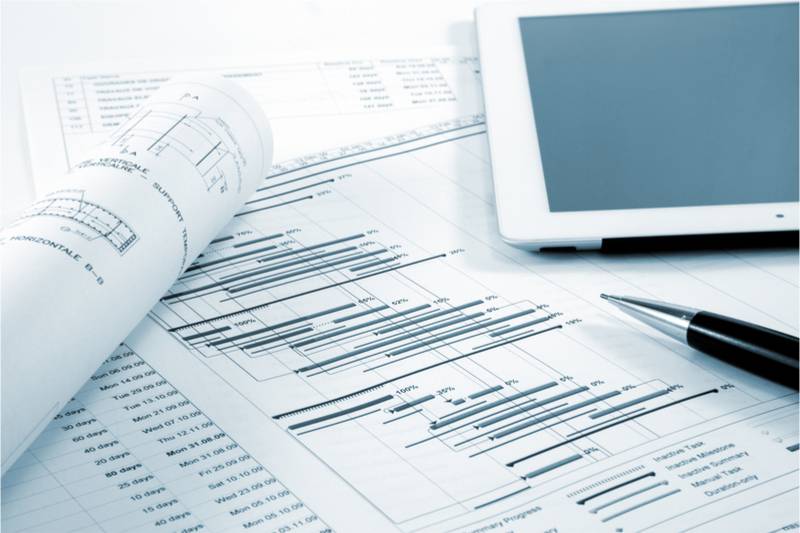Keeping your construction projects on schedule to meet your completion deadline is no easy task. Adverse weather, costly rework, unavailable resources, and subcontractor default are just a few of the things that can throw your timeline off course. Damages and penalties for not hitting your deadline can ruin your profit and hurt your construction company’s reputation.
Here are five tips to help you keep your construction projects on schedule and within budget:
Review Plans, Specs, & Project Documents
To keep your construction project on schedule, you need to go over every detail of the scope of work. Carefully review and understand the construction drawings, spec book, and other project documents. Knowing the project documents like the back of your hand will allow you to craft a better project schedule.
Use site drawings to layout the jobsite for optimal performance by determining placement for material laydown areas, equipment storage, jobsite trailer, break areas, access points for employees, etc. Coordinate with your building project manufacturers and material suppliers to ensure they can deliver the proper quantities of all building materials. Use historical data from past projects to make sure you are allocating adequate times and resources for each activity and task.
Have your subcontractors review drawings and documents relevant to their trades. Provide them with clarification on any inconsistencies or ambiguity in the documents before work begins. This will allow your subs to provide meaningful feedback and insight as they work with you to create a master schedule.
Create & Coordinate a Master Schedule
To deliver your project on time, you need to create a master schedule to guide your project through to completion. Break each project down into phases to manage your project. Phases can then be broken down into tasks that can be broken down further into individual activities.
Scheduling involves assigning estimated start and completion dates for the various tasks and activities. Determine the time required to finish each task or work activity and make sure you can allocate the resources, labor, and equipment, necessary to complete them on your scheduled timeline.
Sequence out tasks and trades during each phase of the project. Keep in mind which tasks must happen sequentially and which tasks can be performed concurrently with other tasks. This will allow you to maximize your timeline and complete the project efficiently.
Work with your suppliers to ensure that your materials will be available and delivered when needed. Involve subcontractors to incorporate their schedules into your master schedule to create a smooth workflow among all trades.
Create Contingency Plans
There are so many ways a project can get off track. Carefully review your master schedule and identify potential risks that could disrupt your schedule. Crafting contingency plans that can easily be executed will go a long way in mitigating and resolving issues before they get out of control.
You may need to assign overtime if you are running behind schedule. Weather delays might require you to bring in extra labor and equipment to get your project back on track. Brainstorm possible schedule delays with the rest of the project team and build contingency plans for each situation. You might not need them all, but you will have them ready to go if you do.
Once construction starts, the goal is to make keep the project on schedule as much as possible. Typically, a project will get derailed by lots of minor issues rather than one huge problem. Carefully analyzing daily progress reports, keeping an eye on the budget and schedule, and managing risks require a high level of attention to detail.
Communicate & Collaborate
Good communication is key to staying on schedule and the successful completion of projects. Establish procedures and protocols for your subs to alert you when they are falling behind or experiencing delays. This will allow you to start adjusting your schedule before the issues snowball into something unmanageable that will cause you to miss your scheduled deadline.
Determine how often, and by what means, information regarding the progress of the project needs to be communicated. When problems arise, work with your subs to troubleshoot issues and resolve delays to keep your project on schedule. Good communication can improve teamwork, lead to better project collaboration and increase jobsite productivity.
Project collaboration is more than just everyone completing tasks on schedule. It involves building a relationship with all stakeholders based on trust and respect, working together to successfully complete a project. Being able to cooperate and coordinate efforts is essential to maintaining your construction schedule.
Sharing ideas and expertise can aid in problem-solving and determining logistics on your project. Collaboration goes hand in hand with good communication and keeping everyone together on the same page. It requires trusting all parties and valuing their input as integral members of the team.
Monitor & Document Progress
Keep track of progress with detailed daily reports. Keep an eye on how close you are sticking to your schedule. Watch for any red flags that might indicate you are falling behind schedule. Measure how well your actual timeline for completing tasks matches up with your master schedule.
Pay particular attention to areas that ran over or were completed earlier than scheduled. Try and determine the causes of these discrepancies with your master schedule. This allows you to improve your planning and scheduling for future projects and compare this project to past performances on similar projects.
Reviewing daily reports can help you identify aspects of your project where you are falling behind schedule. It’s rare that a project adheres exactly to your master schedule.
As the project progresses, changes to your master schedule will need to be made to meet your deadline. Adjust tasks downstream if necessary and keep subs in the loop to any changes that will impact their work.
